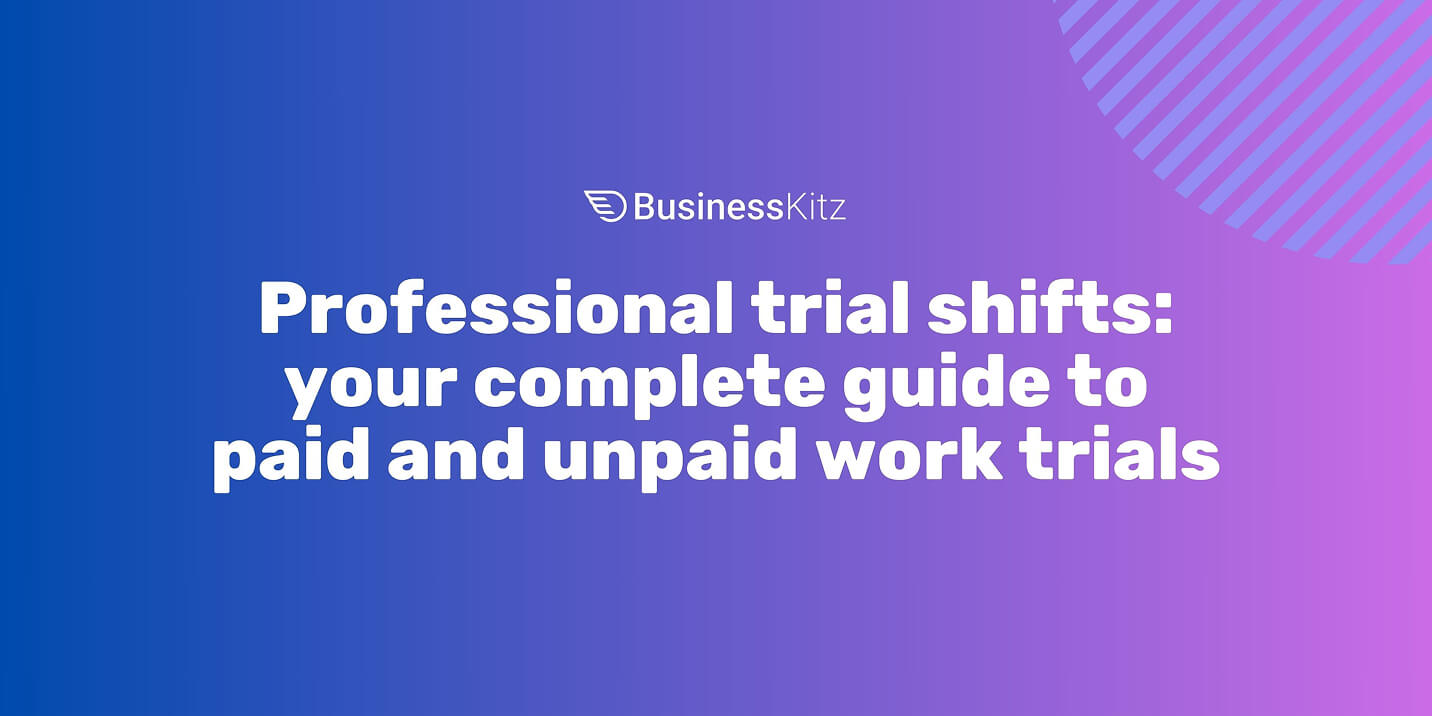
We've helped businesses save $55m with our all-in-one platform. Get instant access to this template and 115+ others, plus AI-powered document creation, starting completely free.
Are you confused about when a trial shift should be paid? Whether you're a business owner looking to assess potential employees or a job seeker preparing for your first trial, understanding the rules around trial shifts is essential for staying compliant with Australian employment law.
At Business Kitz, we've helped thousands of businesses navigate the complexities of employment arrangements. Trial shifts are a common practice, particularly in hospitality and retail, but they come with specific legal requirements that must be followed to avoid costly penalties.
[ez-toc]

A trial shift is a short-term work period that allows employers to evaluate a potential employee's skills and suitability for a role before making a formal hiring decision. It gives employers the opportunity to see how candidates perform in actual work conditions and assess their technical abilities, communication skills, and cultural fit.
According to the Fair Work Ombudsman, a trial shift can be defined as "a demonstration by someone working under supervision to show they have the skills for the job." This practical assessment helps both parties determine if there's a good match before entering a formal employment relationship.
For many businesses, particularly in the service industry, trial shifts provide valuable insights that interviews alone can't reveal. However, there's often confusion about when these shifts should be paid and when they can legally remain unpaid.
The legality of unpaid trial shifts in Australia isn't as straightforward as many business owners believe. To remain compliant with employment law, an unpaid trial must meet all of the following criteria:
According to SafeWork SA, "Unpaid work trials should only occur if it's necessary to evaluate a worker's suitability for a job." Any arrangement that goes beyond this limited purpose creates an employment relationship that legally requires payment.
The Labour Hire Authority Victoria also notes that even if an unpaid trial is lawful under the Fair Work Act, other laws like workplace health and safety and discrimination laws still apply throughout the trial period.
If any of these factors apply to your trial shift arrangement, payment is required:
For example, asking someone to work an entire week of unpaid "trial shifts" while performing regular duties would clearly violate employment law, as would leaving a trial worker unsupervised to handle customer service duties.

Trial shifts are particularly prevalent in:
The prevalence of trials in these industries stems from the practical nature of the work, where seeing someone perform the actual job provides much more insight than an interview alone.
If you're a business owner planning to use trial shifts in your hiring process, follow these guidelines to ensure compliance:
Using our document vault to store trial shift agreements ensures you have proper records of these arrangements, providing protection for your business in case of disputes.
If you're asked to complete a trial shift, you should:

When a successful trial leads to employment, it's essential to formalise the arrangement properly. Business Kitz offers comprehensive employment agreement templates that can be customised to your specific needs.
A proper employment agreement should clearly outline:
Remember that probationary periods—which are different from trial shifts—must be paid at the appropriate award or agreement rate, even though they also serve as an evaluation period.
If you're concerned about the legal risks of unpaid trials, consider these alternatives:
Our document library contains templates for all these arrangements, helping you implement compliant alternatives to traditional unpaid trials.
An employer can only refuse payment if the trial strictly meets all the criteria for a lawful unpaid trial: it's brief, supervised, only demonstrates relevant skills, and doesn't involve productive work benefiting the business. If these conditions aren't met, payment is legally required.
There's no fixed time limit in legislation, but according to the Fair Work Ombudsman, a trial should only last as long as necessary to demonstrate the required skills. This typically ranges from one hour to one shift, depending on the role's complexity.
A trial shift is a brief pre-employment assessment of skills, while a probation period occurs after formal employment begins. Probation periods must always be paid at the appropriate rate and typically last between 3-6 months, allowing both parties to evaluate the employment relationship.
If you believe your trial shift should have been paid, you can contact the Fair Work Ombudsman for advice and potentially lodge a complaint. Keep records of when you worked, what tasks you performed, and any communication about the arrangement.
Yes, if a trial shift extends beyond the typical duration requiring meal breaks under workplace laws (usually 5 hours), these breaks must be provided. All workplace health and safety regulations apply during trial shifts, even unpaid ones.
Understanding the rules around trial shifts is essential for maintaining workplace compliance and protecting your business reputation. Following the guidelines outlined in this post, you can effectively use trial shifts as part of your hiring process while avoiding potential penalties.
At Business Kitz, we're committed to helping Australian businesses navigate employment regulations with confidence. Our comprehensive document templates and secure storage solutions take the guesswork out of managing trial shifts and other workplace arrangements.
Sign up for a free Business Kitz account today to access our extensive library of employment templates and simplify your document management.
But if you require further assistance regarding whether the trial shift you are conducting is legal, our sister company Legal Kitz can help! They specialise in employment-related matters and offer a FREE 30-minute consultation to assist with any of your queries.
Copyright © 2025 Business Kitz 14312161